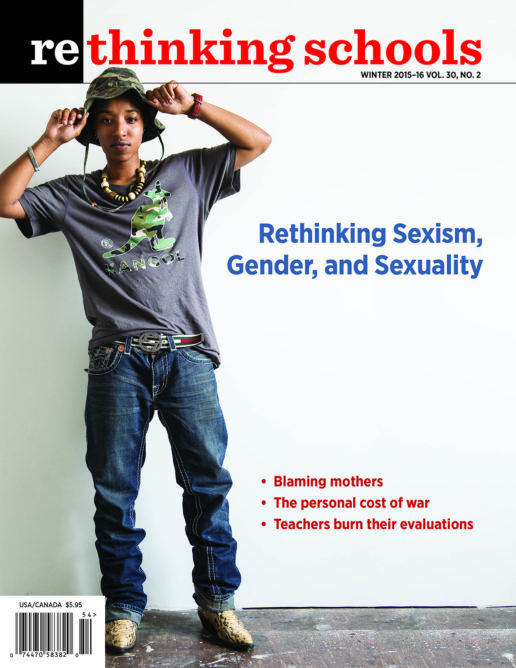‘Rethinking Sexism, Gender, and Sexuality’ and the Power of Grassroots Activism
Illustrator: Lois Bielefeld

The youth on our cover is Lana “kQween” Grant. She was photographed by Lois Bielefeld as part of her Androgeny series. kQween’s pride—and the empathy and respect of Bielefeld’s image—are the values that we tried to embed in our new book, Rethinking Sexism, Gender, and Sexuality.
In a period when the focus has been on anti-bullying legislation and the victory of gay marriage, Rethinking Sexism, Gender, and Sexuality expresses a larger perspective on what liberatory classrooms and schools look like for LGBTQ youth, staff, and families—and, really, for all of us. Our authors teach from an understanding of the intersections of racism, sexism, and other forms of oppression—and integrate this content into curriculum across grade and subject levels. They describe alternatives to zero tolerance responses to homophobia. They talk about creating supportive classrooms, schoolwide and districtwide change, teachers coming out, and teacher preparation.
This is a moment to celebrate the cracks in the edifice of homophobia, but our new book also sends the message: Not so fast—there is more work to be done.
You’ve been seeing articles from the book all along, including Abby Kindelsperger’s “Baby Mamas in Literature and Life” and Lauren Porosoff’s “A Midsummer Night’s Gender Diversity” in the fall issue. But now that the book is done (hurray!), we’re featuring two articles that represent other aspects of the book. The first, “We Begin to Know Each Other,” is Maiya Jackson’s honest and thought-provoking description of her school’s journey to support two trans middle school youth. “Elbow Is Not a Sexy Word: Approaches to Sex Education,” by Jody Sokolower, previews another focus of the book: sex-positive, inclusive sex education.
On other fronts, this has been a year of resistance to the test-and-punish initiatives of the so-called school reformers. “Activism as Professionalism,” by a team of teachers and teacher educators, describes how elementary school teachers in New Mexico are resisting high-stakes testing and defining that fight as a professional responsibility.
“Who Made the New Deal: Part II” completes Adam Sanchez’ two-part series on a people’s history of the Great Depression. This article explores the conservatism of the early New Deal with a role play about the National Industrial Recovery Act.
Ruth Colker’s “Blaming Mothers: A Disability Perspective” is an indictment of the misogyny of many schools and districts in dealing with the parents of children with disabilities.
And, in his poignant “Cracking the Box: The Personal Cost of War,” Chris Hawking tells how he uses mementos from his father, who died in the Vietnam war before his birth, to offer his students a sense of the lingering pain of war.
We can’t end this letter without mentioning some recent victories: After a seven-year struggle, President Obama finally rejected the climate-wrecking Keystone XL Pipeline, which would have moved dirty tar-sands oil from Canada to Texas. He also “banned the box” for federal jobs—no longer will people have to check a box about their conviction records on initial job applications. Both are testaments to the power of activism, and a reminder of the rewards of hope and tenacity.
In the face of massive opposition to standardized testing, Obama and Arne Duncan admitted that the country is “obsessed with testing,” and committed to limiting standardized testing to 2 percent of class time yearly. Two more victories: After a historic grassroots campaign, voters in Jefferson County, Colorado, recalled the school board that wanted to privatize public schools and change the history curriculum to include only the “positive aspects of U.S. history and heritage” and avoid teaching about civil disorder and social strife. And at the University of Missouri, students led a campuswide protest that forced the president and chancellor to step down after they eliminated teaching assistant benefits and ignored repeated calls to deal with racial incidents on campus.
These victories were the result of creative, on-the-ground resistance. They are great examples to bring into the classroom of building principled unity and fighting for change.

